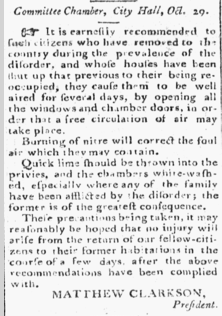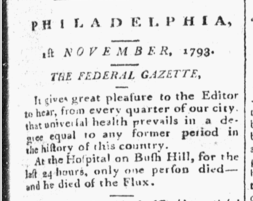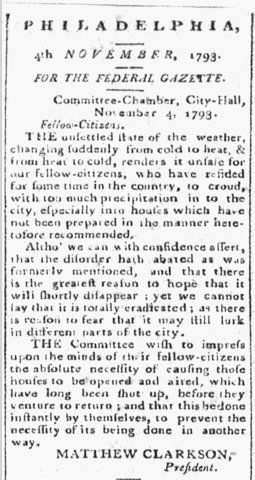This article strains to make Washington& #39;s decision to visit Philadelphia Nov. 11, 1793 into a bold political push for reopening ahead of doctors& #39; orders. But that& #39;s not what the record shows. A thread. https://twitter.com/JonathanDHorn/status/1265725154610622465">https://twitter.com/JonathanD...
Horn uses a concerned letter from Attorney General Edmund Randolph who cautioned the President to represent the feelings of all medical doctors and the opinions of the politicians in Philadelphia. But Randolph was no doctor. He was not in Philadelphia either.
Yellow fever had begun subside in Philadelphia with the first frosts in October. On October 25 the Federal Gazette reported that stores were reopening, "many families returned, and that the city was "once more enlivened...by industry, and by commercial intercourse."
With both the state and federal governments fleeing the city during the epidemic, governance was left to Mayor Matthew Clarkson. On Oct. 29, his committee recommended that anyone returning to city have their homes aired out for several days prior to reoccupying them.
On November 1, the Federal Gazette reported that "universal health prevails in a degree equal to any former period in the history of this country."
A sudden turn of the weather caused some alarm, and on November 4, Clarkson admitted that the disease might not be "totally eradicated" and urged for residents not to crowd into homes without heeding the warnings to air and clean their homes before settling in.
This is likely what Randolph was referring to in his November 10 letter. Washington had no intention or ability of moving his family and his slaves from Mount Vernon back into his house on November 11. Washington wasn& #39;t calling for the city to reopen. It already was.
There& #39;s no indication that anyone was expecting or demanding that Washington reopen the city. It was happening without him. Jefferson wrote to Madison on Nov. 9 that the there had been no new cases and that the inhabitants were "flocking back generally." https://founders.archives.gov/?q=Dates-From%3A1793-11-01%20Dates-To%3A1793-12-31&s=1111311111&r=89">https://founders.archives.gov/...
Horn concludes "The medical experts had an important role. But when to risk venturing back out into the streets was not exclusively a medical decision. It was also a political decision...properly made by a president."
But Washington didn& #39;t defy the experts, he heeded them.
But Washington didn& #39;t defy the experts, he heeded them.
Washington& #39;s Attorney General didn& #39;t represent what was happening in Philadelphia or the views of medical experts there. He did urge caution, but his voice was hardly representative of medical experts, business leaders, or city officials by November 11 when Washington visited.
Well before the President& #39;s visit, printer Matthew Carey had begun writing his 100+ page history of the epidemic. It was published on Nov. 14.
Carey believed that the new Constitution had preoccupied the city with money and luxury contrary to virtue and liberty. But the city responded with an amazing sense of civic duty as benevolent citizens came forward to save their community.
Carey& #39;s retelling of the events in Philadelphia reverberated across the country, not Washington& #39;s brief visit. Carey had notably slighted African American contributions leading Richard Allen and Absalom Jones to writing a rebuttal from the perspective of black Philadelphians
Six months later Dr. Benjamin Rush published his own 363-page account of the epidemic. He also made no mention of George Washington and his visit to the city. Washington& #39;s actions played no role in ending the epidemic or reopening Philadelphia. http://deila.dickinson.edu/theirownwords/title/0020.htm">https://deila.dickinson.edu/theirownw...

 Read on Twitter
Read on Twitter





